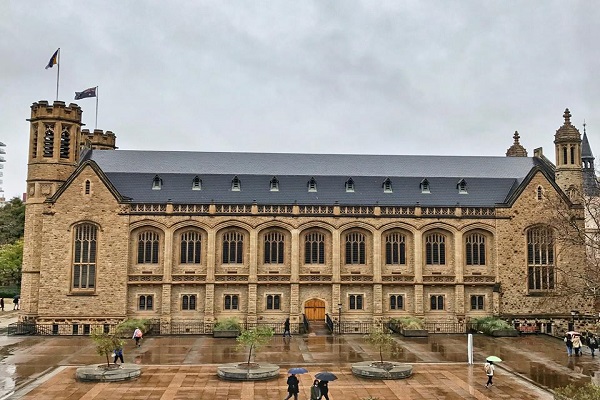University of Adelaide: University’s Tall Poppies stand tall
Dr Tatiana Soares da Costa is one of five of the University’s early career researchers who have received 2022 South Australian Young Tall Poppy Science Awards.
Dr Soares da Costa, Dr Jiawen Li, Dr Zohra Lassi, Dr Qi Wu, and Dr Erinn Fagan-Jeffries have all been recognised for their scientific achievements and for their commitment to sharing their research and passion for science with the wider community.
“The University of Adelaide has world-leading staff who are committed to delivering research that is highly valued both in Australia and internationally,” says the University of Adelaide’s Deputy Vice-Chancellor (Research) Professor Anton Middelberg.
“Our Young Tall Poppies have been recognised for their innovative research to combat challenges faced by society and ultimately improve people’s lives. Their wide-ranging work focuses on a number of different areas, including agriculture, artificial intelligence, and biology.”
The Young Tall Poppy Awards are an initiative of the Australian Institute of Policy and Science.
“Our Young Tall Poppies have been recognised for their innovative research to combat challenges faced by society and ultimately improve people’s lives. Their wide-ranging work focuses on a number of different areas, including agriculture, artificial intelligence, and biology.”
Professor Anton Middelberg, Deputy Vice-Chancellor (Research), the University of Adelaide.
Dr Tatiana Soares da Costa – Research Field: revolutionising herbicides to protect our agricultural industries
Dr Soares da Costa from the School of Agriculture, Food and Wine is a Future Making Fellow and Lab Head. She leads a multidisciplinary research team dedicated to discovering new and safe herbicides that are less prone to developing resistance. Effective herbicides are critical for agriculture. Without them, weeds outcompete crops for resources such as sunlight and nutrients, leading to reduced crop quality and yield.
Her group uses innovative, time and cost-effective strategies to expedite bringing herbicides to the market to ensure food security for future generations.
Dr Soares da Costa commented on her achievement: “I am so honoured to have won the SA Young Tall Poppy of the Year Award.”
“It is a great recognition of the research work my team and I are doing at the Waite Research Institute and the community outreach I am passionately engaged in. I look forward to continuing to share my love of science and inspire the next generation of young scientists.”
Dr Jiawen Li – Research Field: preventing heart attacks
Dr Li, Senior Lecturer from the School of Electrical and Electronic Engineering, is addressing the challenge of accurately diagnosing high-risk plaques before they can cause life-threatening heart attacks. She is doing this by developing hair-sized 3D-printed imaging devices, which provide images of blood vessels with high resolution and molecular insight that is not possible with existing technologies.
“I am very excited about our research as we are incorporating this novel diagnostic tool into standard clinical procedures, to help clinicians optimise therapeutic decision-making for each patient, and to potentially prevent recurrent heart attacks,” Dr Li says.
She also regularly visits high schools, particularly disadvantaged schools to inspire students to pursue STEM careers.
Dr Zohra Lassi – Research Field: breaking down health disparity in developing countries
Dr Lassi is a NHMRC (Emerging Leader 2) funded Senior Research Fellow from the Adelaide Medical School in the Faculty of Health and Medical Sciences. She leads a multidisciplinary team with a vision to ensure that disadvantaged women and children in developing countries thrive and have access to health care and quality of life through effective promotion, and preventive and therapeutic care.
Her research has also tested different ways to deliver essential health and nutrition services in settings that have limited resources, such as the use of community and outreach workers.
“It is always wonderful to have your research recognised and valued in society,” Dr Lassi says.
She credits the Young Tall Poppy Awards for making a difference by promoting science to younger generations.
Dr Qi Wu – Research Field: exploring AI
Dr Wu is senior lecturer and the Director of Vision-and-Language in the University’s Australian Institute for Machine Learning.
He has developed one of the most impactful artificial intelligent algorithms called ‘common-sense visual question answering (VQA)’ that leverages the most advanced techniques in computer vision, natural language processing and knowledge representation, for machines to answer questions.
Dr Wu says the applications of this research are broad, from early year education to aged care, helping vision impaired people to communicate with the visual world more easily.
“It is my honour to receive this award,” he says. “It means that my research contributions are recognised by the people outside my local research community and are accepted by the general public.”
Dr Wu is also a member of the School of Computer Science Outreach team, where he encourages secondary school students to study computer science subjects.
Dr Erinn Fagan-Jeffries – Research Field: investigating Australia’s insect diversity
Dr Fagan-Jeffries is an Australian Biological Resources Study Postdoctoral Fellow, whose research aims to help document Australia’s insect diversity by giving species scientific names and descriptions so that they are identifiable by researchers and the general public.
She leads a citizen science project called ‘Insect Investigators’. The team has worked with 50 regional schools around Australia this year to help students learn more about the insects found around their schools and hometowns.
“It’s really lovely to be recognised with a Young Tall Poppy Award,” Dr Fagan-Jeffries says. “These awards are wonderful because they highlight researchers who are dedicating time to engaging with non-scientists, which I think is such an important part of what we do.”
The Tall Poppies judging panel gave awards to the five winners for their outstanding skills in science communication. Dr Tatiana Soares da Costa demonstrated exceptional talent in this area.

